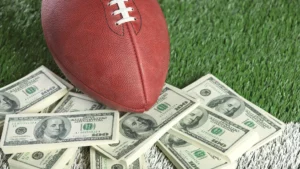There’s something unique about the culture of sports in America. No matter your politics or your background, you can find a sense of pride and community in supporting your team. This sense of camaraderie is on full display at the Super Bowl. Every February, tens of millions of Americans tune into the most-watched television event in the country, regardless of whether or not their home team has qualified. Super Bowl Sunday is such a big deal that it’s been deemed an unofficial national holiday.
But like any major American institution, the National Football League (NFL) has its own brand of influence not just among the public, but within the halls of Washington.
The Gridiron PAC
 Since the mid-2000s, the NFL has taken a more active role in U.S. politics. NFL Commissioner Roger Goodell, son of the late Senator Charles Goodell of New York, boosted the League’s lobbying efforts during his first year on the job. In 2008, he was the primary investor in the NFL’s new Gridiron PAC. This marked the second political action committee established by a sports league (the MLB founded a PAC in 2002). The Gridiron PAC has spent over $1 million annually since then and partners with lobbying firms around the nation’s capital.
Since the mid-2000s, the NFL has taken a more active role in U.S. politics. NFL Commissioner Roger Goodell, son of the late Senator Charles Goodell of New York, boosted the League’s lobbying efforts during his first year on the job. In 2008, he was the primary investor in the NFL’s new Gridiron PAC. This marked the second political action committee established by a sports league (the MLB founded a PAC in 2002). The Gridiron PAC has spent over $1 million annually since then and partners with lobbying firms around the nation’s capital.
“We wanted to have representation,” said Brian McCarthy, the NFL’s vice president of communications. “With many things in the NFL, [it] went from a small business to a larger business with such cultural impact on America that we needed to increase our presence.”
So what does the Gridiron PAC do in Washington? According to the Center for Responsive Politics, most of its lobbying expenses go towards influencing members of the House’s Energy and Commerce Committee and Judiciary Committee. The Energy and Commerce Committee oversees legislation pertaining to athletics.
This influence has had some troublesome results. In 2015, for example, the Energy and Commerce Committee found that the NFL repeatedly interfered in concussion research conducted by the National Institutes of Health. This influence is especially troubling when considering that nearly all former NFL players experience chronic traumatic encephalopathy (CTE), a progressive degenerative brain disorder that can severely impact behavior and mental health.
The NFL’s political activity since 2020
In the wake of the 2020 election, the Gridiron PAC’s campaign and lobbying expenditures raise serious questions. The NFL did not promise to suspend its political donations as the MLB PAC did. Instead, their official spokesperson said they would “re-evaluate” their giving policies.
The PAC’s donations support this lack of action. Though there’s still time before the 2022 election cycle is in full swing, candidates, committees, and PACs receiving these contributions prop up Members of Congress who rejected the results of the 2020 election. These include House Minority Leader Kevin McCarthy, Rep. Steve Scalise, and Rep. Steve Chabot, as well as National Republican Congressional and Senatorial Committees.
To call one’s self an American institution is to reflect American values, including our democracy. That’s why we need to get money OUT of politics!
